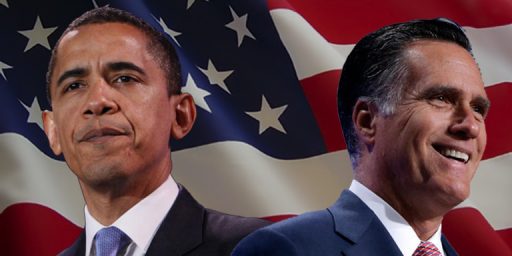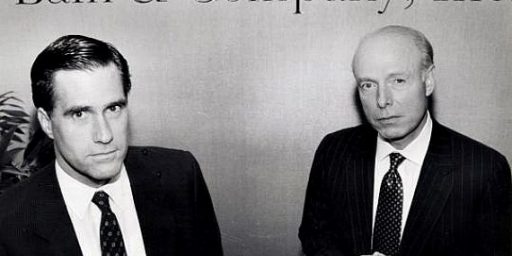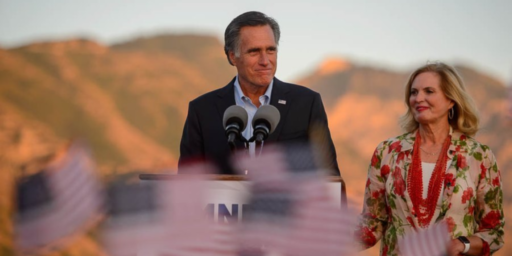Mitt Romney on Economics and Energy Policy
Mitt Romney, in an interview gave us a look at some of his economic views and on energy in particular. Let me provide the translation for some parts of the interview:
I wish we could become energy independent for only $100 billion.
I’m going to spend lots of your money. This will mean either higher taxes now, or in the future…or less of other services the government provides.
But energy independence is going to take a long-term commitment, and the public and private investment will most likely be quite substantial, but the return will be even more substantial.
I know I’m talking out of my a$$, and never mind that if the above were true then there wouldn’t have to be any sort of “Apollo” type project. Simple let private industry do it.
We send over a billion dollars a day out of our country to buy oil and energy from other countries.
Hi, I’m a mercantilist idiot, and I’m going to base my policies on a view of economics that 250 years ago was a bad idea and still is!
Building nuclear power plants, developing carbon sequestration, liquefied coal, or gasified coal will be the more expensive efforts, but the payback is enormous.
Those market oriented economists would call this a profit opportunity and note that private firms would engage in all of the above activities if true. However, I don’t believe in that market mumbo-jumbo and instead I believe in government making people doing things they otherwise wouldn’t do.
The answer is no.
But I’ll do it anyways!
The government should not be picking winners and losers.
So we’ll just throw money at everybody!
The government should not be getting behind companies and say we are going to play venture capitalist.
We’ll call them subsidies, tax credits, and so forth. Sounds friendlier and makes it look like I’m actually doing something.
Venture capital is a tough industry. I know. I’ve been in it, and I wasn’t perfect either.
Which is why I’m now in government! None of that cut-throat competition to keep costs down, stay innovative, etc. That’s tough work! Ha ha.
And government doesn’t play that role.
I am Dr. Remulack.
But in basic science, we invest $50 billion a year in healthcare research.
Right, and some of that money was used to support blatantly silly research that argued obesity kills 400,000 or so people every year. Sure that turned out to be wrong by more than an order of magnitude, but we eventually got to the right answer.
The total investment that we have been able to come up with on new technologies for energy efficiency or energy production is roughly $4 billion a year, and we send a billion dollars a day outside the country.
Did I mention I’m a mercantilist idiot?
Now some might object to the claim that Romney has a mercantilist view of trade, and they could point to the very next question/answer as support where Romney says,
It’s really sad but none of the leaders on the Democratic side and almost no one on our side has any significant experience in the private sector, and that’s why I began with regulatory relief. … [Over-regulation] kills small businesses, and they are the source of a good deal of jobs. And the other is keeping our markets open. That’s something which a lot of people fear, but if we are vigilant in protecting a level playing field, we not only can compete with the rest of the world, we have to compete with the rest of the world. The option of saying, “We can’t compete, we’re too expensive, so let’s put up protective barriers,” that would virtually assure that we go the way of the Soviet Union, that we get outcompeted by other people and become a second-tier economy.
Here is my problem with this: All that stuff about “level playing fields”, “fair trade”, etc. is often code for “I’ll talk about open markets, but really I’ll put in place tariffs and other protectionist policies when I’m in office.” (wink, wink, nudge nudge) We saw this with Bush, lots of talk about “free trade” with a “level playing field” and we had steel tariffs, protectionist policies on imported shrimp, and agricultural products as well. So I don’t see those comments as a commitment to free trade, but as a commitment to use protectionist policies because, Romney is a mercantilist idiot. But to be fair, this charge can be leveled against all of the candidates, IMO, save maybe Ron Paul.






That’s pretty much my take, too, Steve. What I think that everybody is forgetting is that China’s trade with the rest of the world is the most successful anti-poverty program in the history of the world and our best insurance that we won’t be fighting a war with China. Cheap at the price.
But I, too, wish that our deficit with China wasn’t as high as it is. China needs to develop its own internal markets if it is to grow and we need to be allowed to sell into those markets fairly. Bigger pie, not bigger slices of a smaller pie.
As an electric energy professional, it would be nice if I could say our political leaders and would-be leaders have a clear picture of how we actually make electricity here in the US. They don’t. See RadDecision.blogspot.com for one insider’s look at nuclear power.
The argument that we ought to be less dependent on crude oil for each dollar of our GDP (or each worker’s commute to work) isn’t purely mercantilist. We’ve been completely afraid to do anything about the Saudi government’s funding and ideological support for the group that actually attacked us on 9/11 – so, instead, our ‘best approach’ to the Middle East was to invade Iraq. How’d that go?
If we weren’t so desperately dependent not only on oil but on CHEAP oil, we might have had the stones to make the Saudis change.
Steve;
I think we have found the key to world peace…….Get you a job as a translator at the U.N.[grinz]
“What I think that everybody is forgetting is that China’s trade with the rest of the world is the most successful anti-poverty program in the history of the world and our best insurance that we won’t be fighting a war with China. Cheap at the price.”
Huh? Whether our one-way free trade policies with Beijing are enriching them while impoverishing us, that is nothing to celebrate as the best “anti-poverty program in the history of the world”.
Nonetheless, you are correct in one sense: placing revenue tariffs on foreign made products, and using the income to reduce taxation on domestically-made products, is an excellent anti-poverty program, one that we should adopt here in the United States.
Nor does feeding the China Tiger save us from a future war. On the contrary, it makes her stronger and us weaker, encouraging them to miscalculate. An insurance policy that requires us to lose a manufacturing base is not worth it.
Glen, there’s so much wrong in your comment it’s hard to know where to start. We’re being impoverished? Where’s your support for the claim? Since our commerce has risen with China, GDP here has risen dramatically. So have average incomes. Median incomes have even gone up a little, too. This is not the stuff of which impoverishment is made.
A tremendous number of the poorest of the poor in the world are Chinese. Median incomes have risen in China and there’s a lot fewer of the poorest of the poor there than there used to be. This is an unabashedly unqualifiedly good thing.
The advantages of free trade have been well known for 200 years. The tariffs you long for will make us poorer not richer.
Have we become weaker since we began trading substantially with China? The precise opposite is true: we’re stronger by any reasonable measure than ever before.
The measures you’re proposing won’t make us richer, more powerful, or more secure. They’ll do just the opposite.
Quote: “Glen, there’s so much wrong in your comment it’s hard to know where to start. We’re being impoverished? Where’s your support for the claim?”
http://www.vdare.com/roberts/070816_china.htm
http://www.vdare.com/buchanan/071101_trade.htm
Quote: “Since our commerce has risen with China, GDP here has risen dramatically. So have average incomes. Median incomes have even gone up a little, too. This is not the stuff of which impoverishment is made.”
http://www.vdare.com/roberts/070909_rip.htm
Quote: “A tremendous number of the poorest of the poor in the world are Chinese. Median incomes have risen in China and there’s a lot fewer of the poorest of the poor there than there used to be. This is an unabashedly unqualifiedly good thing.”
http://www.vdare.com/buchanan/070823_ltv.htm
I’m opposed to harming American economic interests in order to prop up the standard of living in foreign lands. Charity begins at home.
Quote: “The advantages of free trade have been well known for 200 years.
Phyllis Schlafly begs to differ:
http://www.eagleforum.org/psr/1996/mar96/psrmar96.html
For much if not the majority of our nation’s history, revenue (not protective) tariffs ruled the day instead of the income tax.
Quote: “The tariffs you long for will make us poorer not richer.”
Well, China seems to be following my advice and is thriving as a result. China keeps domestic taxes low while placing revenue and protective tariffs and import VAT taxes on imports.
Free trade–which means hiking (corporate and other) taxation on domestic industry in order to pay for tariff exemptions on foreign products–is really just reverse protectionism. If you insist on foreign-made products not assuming any of the tax burden, you then have to shift taxation domestically to make up for the lost revenue, which falls on local manufacturers.
Quote: “The measures you’re proposing won’t make us richer, more powerful, or more secure. They’ll do just the opposite.”
Don’t expect Beijing to be adopting your advice anytime soon. They are NOT going to get glossy-eyed over free trade and start exempting imports from taxation and make up for the corresponding drop in tax revenues by doubling-up taxation domestically. That’s reverse protectionism–which is the most foolish form of protectionism around.